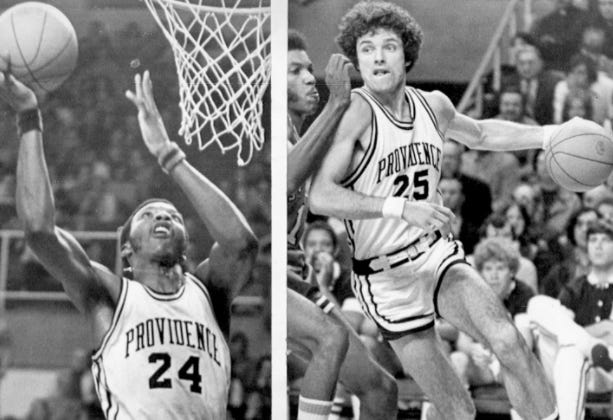Reflections of a Lifelong Friar Fan: The Terrific 1974 Friars
Craig Leighton reflects on how Providence remained elite, despite the loss of Ernie D, during the 1973-74 season.
The only thing that took away from the sting of Providence’s devastating loss in the national semifinals in 1973 was the fact that the following season’s team was loaded.
If the ‘73 group was Ernie D’s team, then the ‘74 one belonged to Marvin Barnes.
Providence lost Ernie DiGregorio, Nehru King, Charley Crawford, and Fran Costello, but returned Barnes and Kevin Stacom, who was coming back to PC despite being drafted by the Indiana Pacers in the second round of the 1973 draft.
In the mid-70s there was a rule that you were automatically eligible for the draft four years after your high school graduation. Therefore, transfers like Stacom were draft eligible, even if they intended on returning to college for their final season. The team drafting the player had until next year’s draft to sign him to a contract. This was how Larry Bird wound up with the Boston Celtics after being drafted in 1978. He was a fifth year senior after having transferred to Indiana State from Indiana, and the Celtics selected him after his junior year.
The 1972-1973 team had four freshmen on it (Mark McAndrew, Rich Dunphy, Dave Modest, and Ron Norwood), but they did not play any meaningful minutes. It was the first year of freshman eligibility and many coaches were unsure on how to best utilize them.
Of the four freshmen, only McAndrew and Dunphy stayed at PC and played on the 1973-1974 team. Norwood went on to have an outstanding career at DePaul, averaging over 15 points a game during his three years there. Modest left Providence after his sophomore season.
Other holdovers from the 1972-1973 team included Gary Bello, Alan Baker, and Bob Olquist.
Like the previous season, depth was the biggest weakness for this Friar squad. Barnes, Stacom, and freshman Bob Cooper averaged in double figures in 1973-74, and only seven players logged meaningful minutes.
One of those seven was a talented freshman from Providence named Joe Hassett, who was the team’s fourth leading scorer (7.2 ppg).
Heading into the season the Associated Press had the Friars ranked sixth in the country in their preseason poll. Once the season started Providence picked up right where they left off, winning five of their first six games.
The highlight of that stretch was a home game against Austin Peay, who boasted the leading scorer in the country, Fly Williams. It was built up as a matchup between the nation’s best scorer versus the best rebounder in the college game in Barnes.
Williams, a New York City playground legend, scored 40, but Barnes was not to be outdone. He set Providence’s single game scoring record with 52 points. Barnes added 19 rebounds in a 94-92 Friar victory — a win which wound up being one of the all-time classics at the Civic Center.
The Friars would go on to finish the regular season with a 22-3 record, and a #8 national ranking heading into the NCAA Tournament.
For the second consecutive season, Providence went undefeated in the Civic Center, a building they had not yet lost a game in.
In the first round of the NCAA Tournament Providence breezed past Pennsylvania behind a monster effort from Barnes (26 points, 17 rebounds, 4 assists, 4 steals, 4 blocks). The win set up a matchup with the team ranked number one in the country, North Carolina State.
The Wolfpack were led by National College Player of the Year David Thompson who averaged 26 points and eight rebounds a game.
Other key members of the Wolfpack were 7’2 center Tom Burleson and 5’7 point guard Monte Towe.
Unfortunately, Barnes was held to 14 points by Tim Stoddard, a very good defensive forward who went on to play several seasons of Major League Baseball as a pitcher. In fact, Stoddard and former Cleveland Indian great Kenny Lofton are the only two players to appear in both the Final Four and the World Series.
Thompson was a force against PC, leading the Wolfpack with 40 points as they won going away, 92-78. NC State then went on to avenge their only loss of the season by knocking off UCLA in double overtime in the national semifinal before defeating Marquette for the title. The win over Marquette marked their 28th consecutive victory.
Barnes was tremendous in his final season in black and white, averaging over 22 points per game and leading the country in rebounding with 18.7 per game. Stacom averaged 18.5 points per game, while freshmen Bob Cooper (12 points, 7.5 rebounds) and Joe Hassett were key contributors in their first year.
Barnes was a consensus first team All American and was drafted second overall in the NBA Draft by the Philadelphia 76ers. However, he chose to start his career with the Spirits of St. Louis in the ABA.
Kevin Stacom was a UPI Third Team All American, and was drafted in the second round by Boston where he played four seasons and won an NBA title in 1976.
Despite the loss of two all-time great Friars in Barnes and Stacom, the future was still looking bright for PC due to a great incoming freshman class and the emergence of yet another historically great local player...




Great Job Craig...we were there making those memories
What different times. Imagine if the young men like Marvin Barnes, David Thompson, Fly Williams, and countless others could have benefited from the educational support, social skills counseling and career guidance that today’s athletes enjoy. Also only in that era could athletes like an older Bob Cooper and tiny Monty Towe emerge. Thanks for the great memories and intriguing insights.